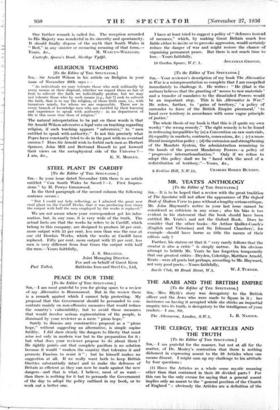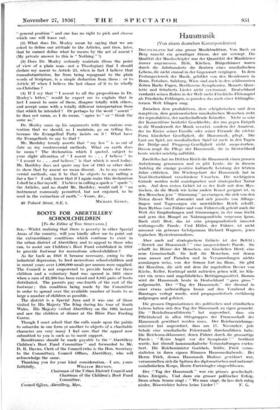THE CLERGY, THE ARTICLES AND THE TRUTH
[To the Editor of THE SPECTATOR.]
am grateful for the manner, but not at all for the matter, of Dr. Mozley's contention that there is nothing dishonest in expressing assent to the 39 Articles when one means dissent. I might sum up my challenge to his attitude by four questions : (1) Have the Articles as a whole some mystic meaning other than that contained in their 89 divided parts ? For this can be the only excuse for saying that a general assent implies only an assent to the " general position of the Church of England " : obviously the Articles are a definition of the " general position " and one has no right to pick and choose which one will leave out.
(2) What does Dr. Mozley mean by saying that we are asked to. define our attitude .to the Articles, and then, later,. that he cannot define what he means by the act of assent ? (My private answer to this is " Nothing " !) (3) Does Dr. Mozley seriously maintain (from the point of view of a plain man—not a Theologian) that I should declare my assent to Article 25, when in fact I believe that transubstantiation, far from being repugnant to the plain words of Scripture, is a simple deduction from them : or to Article 37 when I believe the last clause of it to be wholly un-Christian ?
(4) If I say that " I assent to all the propositions in Dr. Mozley's letter," would he expect me to explain that in fact I assent to sonic of them, disagree totally with others, and accept some with a totally different interpretation from that which he intended Y Or perhaps by the word " assent " he does not mean, as I do mean, " agree to " or." think the same as."
Dr. Mozley sums up his arguments with the curious con- tention that we should, as I maintain, go on telling lies, because the Evangelical Party insists on it ! What have the Evangelicals to say to that ?
Mr. :Bardsley tersely asserts that " my law is as out of date as my controversial methods. What on earth does he mean ? The declaration which I quoted, subject to your slight alteration of " I assent to . . . .1 believe to " I assent to . . . and believe,- is that which is used today. Mr. Bardsley does not quote any law of 1865 or other date to show_ that by assent we mean dissent. As to my contro- versial methods, can it be that he objects to my calling a liar a liar ? I only know that if I again make this declaration I shall be a liar myself. r believe in callings spade a " spade ": the Articles, and no doubt Mr. Bardsley, would call it " an instrument commonly permitted, but not enjoined, to be used in the extraction of earth.--Yours, &e.,















































 Previous page
Previous page